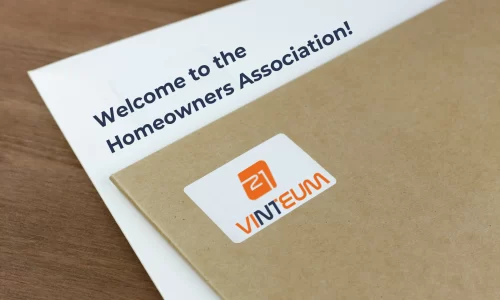A barking dog is a nuisance for neighbors and for the HOA that has to deal with it. If your community has a lot of dogs, you may want to consider HOA dog barking rules.
In this article, we’ll talk about how to deal with an owner that has a noisy dog. Then, we’ll go into what rules your HOA should have around dogs. Finally, we’ll examine the laws around emotional support dogs.

Complaints
Complaints about dogs barking normally begin with neighbors who are being bothered by the noise. They may have already spoken to the owner, and possibly the police as well.
It’s important for the board to remain impartial, and base your case on the facts.
Get in touch with the dog’s owner
Even if the person who brought the issue to the board has spoken to the owner, you should do the same. Let the owner know that people have complained to the board. That you’d like to work with them on how they can reduce the dog’s barking. These ideas can include:
Exercise
Regularly walking your dog helps to reduce their barking. If they’re happy and tired from walking and playing, they’ll happily nap while their owner is out or busy.
Reduce stimuli
If the dog gets stressed by cars, lights, or people walking by, the owner could close the drapes so that the dog wouldn’t be able to see outside. This may help to relax them and reduce how much they bark.
Companionship
Dogs are social animals, they need to be entertained. Their owner should play with them, and walk them regularly, as we said above. When they’re busy, the owner could ask a dog walker to come around to keep them company.
Another alternative is doggy daycare, where dogs can be dropped off in a safe environment where they can make friends and have fun.
Check the CC&Rs
If talking to the owner doesn’t work, you need to check what your HOA’s bylaws and CC&Rs say about dogs and noise. If there aren’t specific rules on pets, then you can check the rules around noise. You can’t create a new HOA dog barking rule or twist an existing one just to get one person. An HOA board always has to be fair and consistent. You can introduce the idea for a new rule at a meeting to see if you can implement a general rule around dogs barking, pets, or noise.
Send a warning
If there are clauses around noise or dogs barking, then you should send a warning to the owner. Clearly state why they’re getting a warning, and explain what steps they need to take to not get in any more trouble. Remember that they love their pet, so be very clear about what the problem is. This should ensure that they see that there is an issue, as they may not have realized before.
Creating HOA Dog Barking Rules
If the board chooses to go ahead with creating rules around dogs you need to consider a few things. What will you do about dog mess, dogs exercising, and noise? You can also create rules for cats and other animals, but dogs are the most troublesome.
Exercising dogs in HOAs
One reason your HOA may be receiving complaints about dogs barking is that you have strict rules around dogs exercising in the community. Dogs that haven’t been exercised tend to have pent-up energy that they channel into barking. Perhaps the board could revisit rules around dogs exercising in the HOA. You could make a dog-friendly area, this may reduce the amount of barking in your neighborhood.
What about dog mess?
This isn’t really a question, because it needs to be cleaned up. Dog poop is not a nice addition to the neighborhood. In fact, it’s an environmental hazard that contains bacteria that can affect water supplies. Owners must clean up after their dogs, or be fined.
Putting up signs around the community to remind residents of the rules is also a great way to prevent issues and complaints. Click below to download our free pet signs that you can easily print out and use!

HOA dog barking rules
Creating rules around dogs’ barking is tricky because dogs do bark. Problems arise when they bark all the time, especially if they bark a lot at night. Rules around barking should focus on constant barking or howling, as that disturbs the peace. The other factors are the volume, the duration, and what time they’re barking. You should consult an attorney to make sure that the new rules are in line with state laws.
Emotional Support Dogs
Emotional support dogs aren’t the same as service dogs. The latter are highly trained to help their owners with disabilities, whereas emotional support dogs aren’t. That doesn’t mean they can’t be helpful to their owners, but they’re not held to the same standards as service dogs.
However, under the Fair Housing Act, emotional support animals are allowed, even if the building or community doesn’t allow pets. The resident must have an Emotional Support Animal (ESA) letter from a doctor, registered nurse, or psychologist. Their pet isn’t considered an ESA unless they have documentation from a registered healthcare professional.
Having said that, emotional support dogs need to follow the same rules as normal dogs, they shouldn’t bark excessively or leave any mess in the community.
Wrapping Up HOA Dog Barking Rules
If your HOA receives a lot of dog barking complaints, then you need to consider what the problem is.
Are HOA rules on dogs too strict? This could lead to dogs not being exercised, so they bark instead. If that is the case, then the board could change the rules around having dogs.
Or, if the fault lies with the owners, the HOA can talk with them to see if they can stop their pup from barking so much.
Using Neigbrs by Vinteum you can keep track of all the pets in your neighborhood. Residents can have dog-walking groups, and board members can send out emails or texts to different groups. Do a free demo to find out how we can help you help your community.
What are HOA dog barking rules?
HOA dog barking rules are guidelines established by your Homeowners’ Association (HOA) to ensure that barking noise from dogs remains reasonable, not excessive, and doesn’t disturb other residents.
Why do HOAs have dog barking rules?
HOAs establish these rules to maintain a peaceful and harmonious environment for all residents, as excessive barking can be disruptive and bothersome.
How much barking is considered excessive?
Excessive barking is usually defined as prolonged or frequent barking that disturbs neighbors’ peace. Specific time limits may vary, so check your HOA’s rules for details.
What should I do if my dog barks a lot?
If your dog barks excessively, try to identify the cause and address it. Training, socializing, and providing mental stimulation can help. If the barking continues, consult your vet for advice.
Can my dog never bark?
It’s normal for dogs to bark occasionally. HOA rules generally aim to control prolonged or intense barking that disrupts the community’s quiet enjoyment.
Are there quiet hours for dogs?
Some HOAs may have designated quiet hours during which excessive noise, including dog barking, should be minimized. Check your HOA’s guidelines for any specific quiet hours.
What happens if my dog violates the barking rules?
Consequences for violating barking rules vary. Initially, you might receive a friendly reminder. Repeated violations could result in fines or other actions outlined by your HOA.
Can I appeal if I think a barking complaint is unfair?
Yes, most HOAs allow for appeals. Gather evidence of your efforts to manage the barking and present your case to the HOA as needed.
Are there exceptions for service dogs?
Service dogs are usually exempt from HOA dog barking rules because they perform essential tasks. However, it’s still a good idea to inform your neighbors about your service dog.
How can I approach my neighbor about their dog’s excessive barking?
Initiating a polite and calm conversation about the barking issue is a good way to share your concern and work toward a resolution together. If that doesn’t work, you should notify the board.








2 Responses
I have a little dog at the back of us that does not shut up the whole time it’s outside 😒 it barks and barks and barks the owners have done really nothing about it except say shutttt upppppp then he goes back inside or the woman will come out and just go shhhhh like that’s going to do anything I’ve tried different types of ultrasonic devices this dog just gets louder and barks right over the top of it like hes challenging them I work nights so I sleep during the day well trying to and this dog can be heard anywhere from around my house I cannot have visitors over cos we can’t enjoy ourselves outside cos all they hear is that dog barking the whole time they can even hear it in my home well my bedroom faces the back yard and this dog will just stand there mid yard and stick its muzzle in the air and just bark for no reason and at nothing this has been going on for months I should have a right to be outside I have to sleep in the living room and blare my TV 📺 really loud just so I can drown out its barking but yet it finds a way to bark over that too this has gotten way out of hand other neighbors have also told me they hear it too
Hi Michelle,
I’m sorry to hear about your experience with the noisy dog in your neighborhood. I understand how annoying it can be to deal with constant barking. Have you considered talking to your neighbors about the barking? Perhaps they are unaware of how disruptive it is, or they may have some solutions they can try. Open communication is often a good first step to resolving issues. If talking to your neighbors does not work, then you can consider other options such as contacting a mediation service or local animal control.